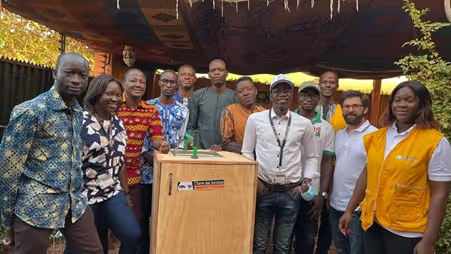Gravit’eau – Handwashing where it doesn’t happen

Project overview
Gravit’eau is a water-recycling handwashing station that provides access to safe, clean handwashing in humanitarian contexts where water is scarce.
Project solution
This project offers [specific solution or intervention] to tackle [challenge]. By implementing [strategies, tools, or innovations], the project aims to achieve [desired outcomes]. The approach is designed to [specific actions or methods] to bring about meaningful change in [community, region, or issue area].
Expected outcomes
This project aims to achieve [specific outcomes], such as [measurable results, improvements, or changes]. The expected impact includes [benefits to the target community, advancements in research or innovation, or long-term effects]. By the end of the project, we anticipate [specific changes or milestones] that will contribute to [broader goals or objectives].
WHAT IS THE HUMANITARIAN NEED?
The 2019 Joint Monitoring Programme Global Baseline Report estimated that more than half of schools and 45% of primary healthcare facilities in low- and middle-income countries lack essential handwashing facilities, basic hygiene, and water supply systems. In many cases staff lack the capacity and knowledge to adequately manage WASH services. WASH infrastructures in these communities often fail because of factors including: a mismatch between the infrastructure and the specific contextual needs; a lack of awareness and ownership; and a disconnect between national regulations and government technical services that struggle to support communities in crisis situations.
WHAT IS THE INNOVATIVE SOLUTION?
Hands4health is working to improve the WASH conditions in institutions that are not connected to a functional water supply. It aims to establish a systemic approach to WASH that serves the most vulnerable populations by combining technology, management, monitoring and behaviour-change concepts in well-designed interventions. The innovation includes the installation of Gravit’eau handwashing stations that recycle water and enable up to 100 people per hour to wash their hands in conflict-affected areas, refugee and internally displaced camps, informal settlements and remote rural areas.
WHAT PROGRESS HAS BEEN MADE?
Four years of intensive research, and piloting and implementation in 52 schools in Nigeria and Palestine and 48 healthcare facilities in Mali and Burkina Faso produced positive results. Mali, Burkina Faso and Nigeria managed the local production and implementation of 70 Gravit’eau handwashing stations. Palestine conducted major WASH rehabilitation in 18 schools. Local staff in all countries were trained to become RANAS experts in changing the behaviour of schoolchildren and healthcare staff. Regional authorities and school and healthcare staff were trained in conducting regular drinking water chlorination. To ensure sustainability, WASH FIT committees, comprising health centre staff and community members, were formed to take over the responsibility of continuously assessing and managing the maintenance and long-term financing of the WASH infrastructure in the health centres targeted by the project.
INNOVATION POTENTIAL
Uptake by authorities and local stakeholders shows that hands4health is filling existing gaps and fitting the needs of users and implementers. The team will maintain the momentum the hands4health initiative has generated towards better hygiene in communities that are already challenged by water scarcity. It plans to extend the use of its chlorination tool and to further engage with, and build the capacities of, RANAS experts.
[.slimline-cta-box][.slimline-cta_heading]Links to more information[.slimline-cta_heading][.slimline-cta_paragraph]Website
Newsletter
Knowledge products
Project flyers[.slimline-cta_paragraph][.slimline-cta-box]
Project delivery & updates
Stay up to date with the latest developments from this project. Here, you will find details on what has been delivered, resources created, and regular updates as the project progresses. Access key documents, reports, and other materials to see how the project is making an impact.
